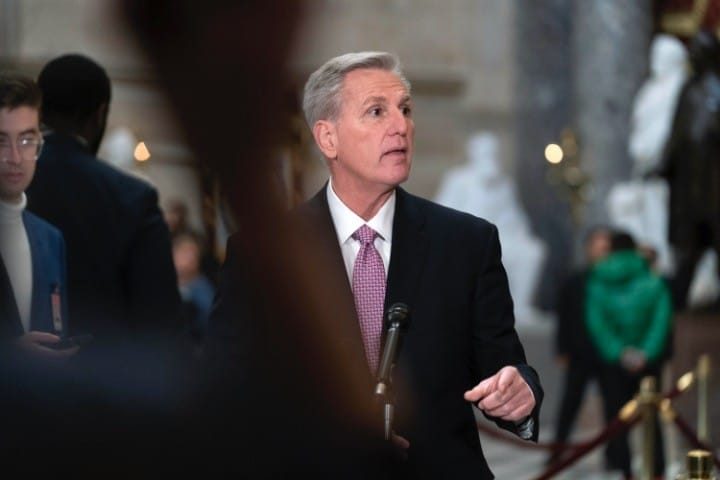
President Joe Biden hosted House Speaker Kevin McCarthy (R-Calif.) in the Oval Office on Wednesday, where they had a “frank and straightforward dialogue” on the debt limit and government spending. The nation reached its debt limit ceiling of $31.4 trillion in January, prompting the meeting as now both Congress and President Biden will need to agree to raise or suspend the statutory debt limit before a Treasury Department-imposed deadline in June to keep the government solvent.
Reuters reported,
“The president and I had a good first meeting,” McCarthy told reporters after the more-than-hour-long meeting. He said the two men shared their perspectives with each other. “I think at the end of the day, we can find common ground,” he said.
According to the White House, “President Biden made clear that, as every other leader in both parties in Congress has affirmed, it is their shared duty not to allow an unprecedented and economically catastrophic default. The United States Constitution is explicit about this obligation, and the American people expect Congress to meet it in the same way all of his predecessors have. It is not negotiable or conditional.”
Both McCarthy and Biden know quite well that they need to come to an agreement over the debt limit and government spending before the June deadline, as according to the Treasury Department, failure to act could trigger an unprecedented default, which experts say could rattle financial markets and push the country into a recession.
McCarthy not only needs to find common ground with Biden, but he also needs to secure a strong footing within his own fractious House Republican caucus. Many of the truly fiscally conservative Republican House members are seeking to use the debt ceiling as leverage to force needed cuts in government spending and overall reduction of the nation’s debt. To date, the Republicans have yet to rally around any specific budget plan.
Another serious issue facing McCarthy in seeking compromise on the budget and debt ceiling is his agreement to a House rule that enables any single member to call for a vote to unseat him. He agreed to this while he fought to gain enough votes to become speaker. If he doesn’t hold the line with the fiscally conservative or Freedom Caucus members of the House, use of that rule could prematurely end his leadership role. Freedom Caucus members advocate for “open, accountable and limited government, the Constitution and the rule of law and policies that promote the liberty, safety and prosperity of all Americans.” McCarthy placed three Freedom Caucus members on the Rules Committee, which would allow them to block any vote on a compromise.
If McCarthy is worth his salt and can negotiate with his party and find an agreement that Biden will accept, he will be able to solidify his leadership role and gain much needed respect from his foes. To do that, he doesn’t have to look far into the past. He can simply use Biden’s own words and tactics when, in 2006, then-Senator Biden (D-Del.) voted against raising the debt ceiling, expressing alarm about the rapid increase in the debt under then-President George W. Bush.
According to Breitbart, in his Senate floor speech Biden said of Bush:
Facts had changed. His promise to balance the budget, his promise to pay down the debt, were proved to be false….
But he refused to take responsibility for his policies. He refused to admit that a changed world demanded a change of course.
His refusal has pushed us deeper and deeper into the hole. His refusal added $450 billion to the debt in 2002; it added $984 billion in 2003; it added $800 billion in 2004. And here we are again today, adding another $781 billion. With that addition, our national debt will be $8.6 trillion at the end of this year.
The President’s budget plans will bring that number to $11.8 trillion at the end of the next 5 years. This is a record of utter disregard for our Nation’s financial future. It is a record of indifference to the price our children and grandchildren will pay to redeem our debt when it comes due. History will not judge this record kindly.
Wednesday’s meeting with Biden and McCarthy is the first of many on finding an agreeable solution to the debt limit. If McCarthy plays his cards right and wins his hand with cutting spending and reducing debt, it will be a huge win not only for a divided Republican Party, but for overtaxed Americans as well.




